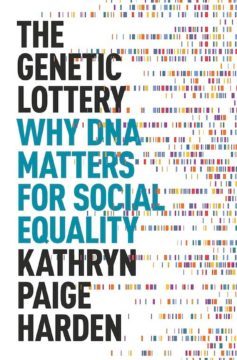Brenna M. Henn, Emily Klancher Merchant, Anne O’Connor, and Tina Rulli in the Los Angeles Review of Books:
 DNA plays a major role, indeed a starring role, in generating socioeconomic inequality in the United States, according to Kathryn Paige Harden, a behavioral geneticist at the University of Texas. In her provocative new book, The Genetic Lottery: Why DNA Matters for Social Equality, she contends that our genes predispose us to getting more or less education, which then largely determines our place in the social order. This argument isn’t new. It has appeared perhaps most notoriously in Arthur Jensen’s infamous 1969 article in the Harvard Educational Review (“How Much Can We Boost IQ and Scholastic Achievement?”) and in The Bell Curve by Richard Herrnstein and Charles Murray, published in 1994. Harden updates the argument in three ways. First, she grounds her claims in cutting-edge genomic research utilizing a technique called genome-wide association. Second, she explicitly rejects the racist claims made by Jensen, Herrnstein, and Murray, arguing that genetic differences account only for socioeconomic inequality between individuals within racially defined groups, not between racially defined groups. Third, she argues that attributing socioeconomic inequality to “nature” rather than “nurture” does not absolve society from ameliorating it.
DNA plays a major role, indeed a starring role, in generating socioeconomic inequality in the United States, according to Kathryn Paige Harden, a behavioral geneticist at the University of Texas. In her provocative new book, The Genetic Lottery: Why DNA Matters for Social Equality, she contends that our genes predispose us to getting more or less education, which then largely determines our place in the social order. This argument isn’t new. It has appeared perhaps most notoriously in Arthur Jensen’s infamous 1969 article in the Harvard Educational Review (“How Much Can We Boost IQ and Scholastic Achievement?”) and in The Bell Curve by Richard Herrnstein and Charles Murray, published in 1994. Harden updates the argument in three ways. First, she grounds her claims in cutting-edge genomic research utilizing a technique called genome-wide association. Second, she explicitly rejects the racist claims made by Jensen, Herrnstein, and Murray, arguing that genetic differences account only for socioeconomic inequality between individuals within racially defined groups, not between racially defined groups. Third, she argues that attributing socioeconomic inequality to “nature” rather than “nurture” does not absolve society from ameliorating it.
More here.
